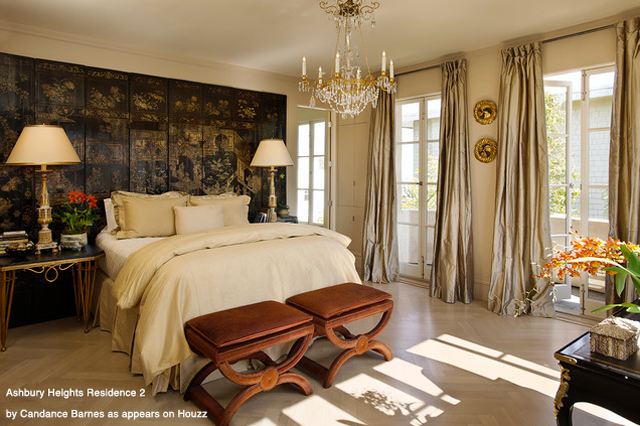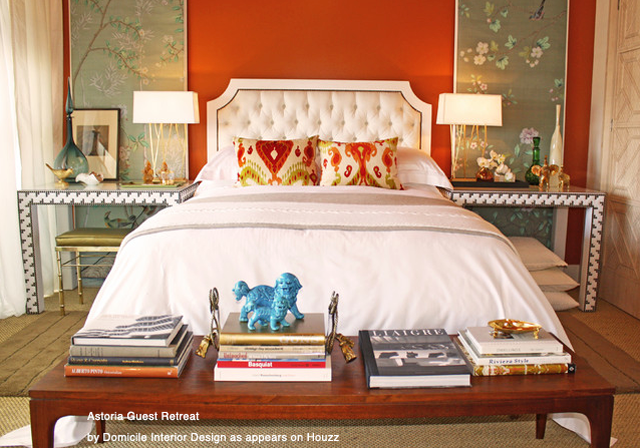
Post by Kyle St. Romain.
A French term that loosely translates as “Chinese-esque,” chinoiserie (pronounced: shen’wäz-re’) describes a European style of art and design dating back to the seventeenth century when early traders first started brining art, fabrics, and silks back from Asia.
Characterized by its use of fanciful imagery of China, asymmetrical balance, whimsical contrast, Chinese porcelain and lacquer like materials, chinoiserie has long been a popular style of interior design — particularly amongst the Chinese, French, and English aristocracy. Notably, Louis XV of France favored chinoiserie design, and decorated entire rooms at the Château de Chantilly in the chinoiserie style. Other prominent people who have incorporated chinoiserie in their homes include: Tory Burch, Ann Getty, Pauline de Rothschild, and Yves Saint Laurent.
If you want a bedroom that is colorful, vibrant and exotic, chinoiserie may be a style to consider. When done right, it exudes a sense of sophistication, worldliness, and high-class that you simply cannot get from any other style. Chinoiserie design also provides ample opportunity for collectors to incorporate antique and vintage pieces into their décor. While authentic chinoiserie pieces can be quite expensive, reproductions offer the same look at a fraction of the cost.

Some common elements of chinoiserie design include:
- Vibrant silk wall coverings patterned with flowers, birds, bamboo, or butterflies.
- Colorful Chinese statues of exotic animals, pagodas, and historical figures;
- Glossy table lamps, vases, and plates painted with scenes of Chinese life;
- Lacquered furniture with classic chinoiserie curves; and
- Decorative throw pillows.
Many of the elements that make chinoiserie so great for some, also makes it unsuitable for others. It is often said that you either love the style or hate it, but I think there is a middle ground that can be achieved. So, don’t discount chinoiserie entirely if the bold colors and whimsical imagery are too energetic for your bedroom; you can still incorporate elements of chinoiserie design without losing too much of the tranquility you’ve come to expect from a bedroom.
For example, instead of covering your entire room with fanciful wall coverings, you could frame smaller pieces of silk wallpaper and use it as paneling to create an accent wall behind your bed. You can also incorporate a couple carefully selected chinoiserie lamps, ceiling fixtures, and small decorative statues and vases. While the most easily recognizable chinoiserie lacquered furnishings are painted with fanciful scenes, a simple curved black or brown glossy piece can be a more subtle way to make your space a little more chinoiserie. You may also opt for more muted color palette using colors like dark teal, and flat gold, instead of vibrant pink, gold, and silver colors.
If you’d like to learn more about chinoiserie design, be sure to check out the Chinoiserie Chic blog. For more inspiration, Houzz also has a channel with striking examples of how people have created fabulous chinoiserie bedrooms.

